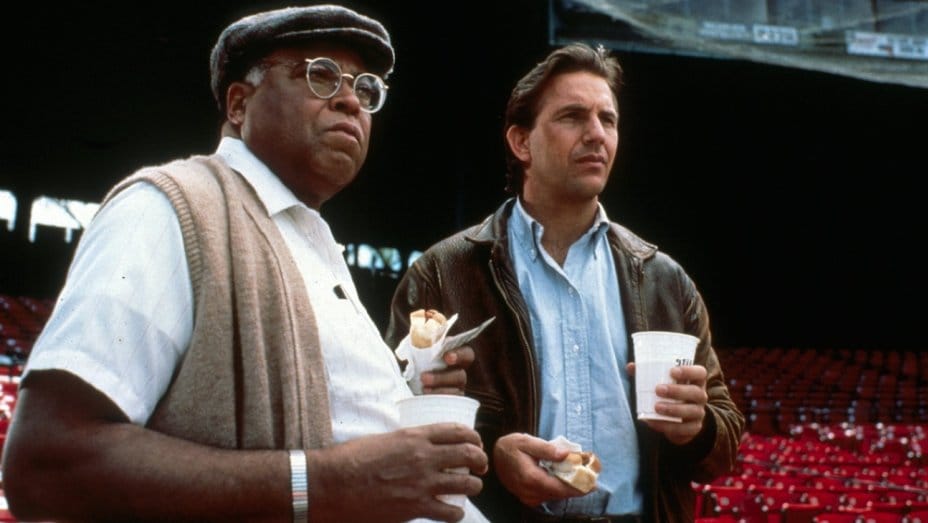Does the Dream Hold Up?
Watching baseball movies means opening up the door to nostalgia and sentimentality. It seems part and parcel with the ideal of baseball. And no film leans into that more than Field of Dreams, for better or worse.

It’s summer, which means it’s baseball season. My team happens to be good this season (Go Phillies!), so I’m living in the of the moment of the baseball feels and wanted to scratch that itch further with a classic baseball movie.
Generally speaking, watching baseball movies means opening up the door to nostalgia and sentimentality. It seems part and parcel with the ideal of baseball. And no film leans into that more than Field of Dreams, for better or worse.
I remember the movie fondly with positive feelings, but while I’ve seen it many times, I haven’t watched in several years. Every summer I think about giving it a rewatch, as it fits with the idea of summer— BBQ, beach, and baseball. But I usefully don’t get around to it for one reason or another, mostly BBQs and the beach (and kids).
More recently though, with it on my mind, I’ve wondered if it will hold up to my previous feelings towards it. I know the movie well but feel I may now have conflicting views with some of the ideas it proposes around nostalgia and wishing to go back to a past era when things were ‘simple’.
When I was young, I connected with that idea because the thing is, growing up, you eat it up sentimentality, having it instilled in you that there used to be a better way. You don’t know any better and as you see what you are experiencing as a kid, everything is great. But adults lament about a time when everything was better, gives you a nostalgia for a time you’ve never lived through. The paradox here is that everyone’s childhood is the best, most simple time.
With all these heady thoughts swirling around my mind, I finally made time for a rewatch.
To my great relief, it tracks exactly as I’ve felt about it. It’s a really great movie, that treads the sentimentality line but never really crosses it, except for that one time (more on that in a moment). But it holds up to that memorable connection I’ve had with the movie over the years.
It’s more than just holding up, though. It’s actually a really well-made, tight, earnest film that matches the mystical with a down to earth aspirational attitude. That balance is such a hard thing to do in a movie, but it nails it. There is absolutely zero waste in this movie, with true motivations, a clean progression of events that doesn’t waste time but also allows the small moments to breathe. It all adds up to an ageless movie.
This is not the type of movie that gets made anymore, at least in the studio system. This is a classic late 80s early 90s relatable light drama, a polished classically produced movie anyone can watch appealing across demographics. It’s a high watermark of this type of film.
It’s clean, straightforward, doesn’t try to be anything that it’s not, all the while engaging, with a story that you don’t know where it’s going in the best possible way.
One of the knocks against it is its sentimentality and earnestness. Which I can see how that is a perspective, but to me is a lame assessment. Cynical really.
The one area that is a challenge for me — that I expected upon the rewatch— is the nostalgia the film professes and comments on for the old days of baseball (and hence life). The moment I referred to earlier is the monologue from Terrance Mann (the James Earl Jones character). It is the penultimate scene to the climax of the film, but that lays out the notion that baseball is the mirror of the country— it reflects us to ourselves and morphs and changes as America does.
And while that idea is intriguing, (I haven’t pondered on this idea much), what bothers me most is the line ‘This field, this game: it’s a part of our past, Ray. It reminds us of all that once was good, and it could be again.’
This frustrating notion, to me, is reductive and backwards thinking. It ignores progress, specifically related to parts of a dark, shameful history (see the Color Line) and the inevitable march of time. Wishing for a time gone by helps no one. Its important to remember where you came from, both as a sense of self and to minimize remaking mistakes of the past , but not accepting evolution and embracing the current dynamics of any area of life leads to conflict.
It’s an off tone idea that that hasn't aged well and seems to conflict with the rest of the message of the film. The story reflects on the passage of time, uncomfortable change it brings about, decisions of regret that we live with, but the eventual, necessary evolution of life that pushes us to confront our past challenges.
The film's overall contemplation of these ideas allows me to compartmentalize this frustrating aspect of the film, appreciating it's imperfection. Some people won't. Some will nitpick other areas of the film. That's okay. This rewatch has made me realize my evolved feeling toward the film realizes the intention of the film.
For me, the film holds up, and I have more appreciation for it than I ever have and look forward to rewatching it more often.





Comments ()